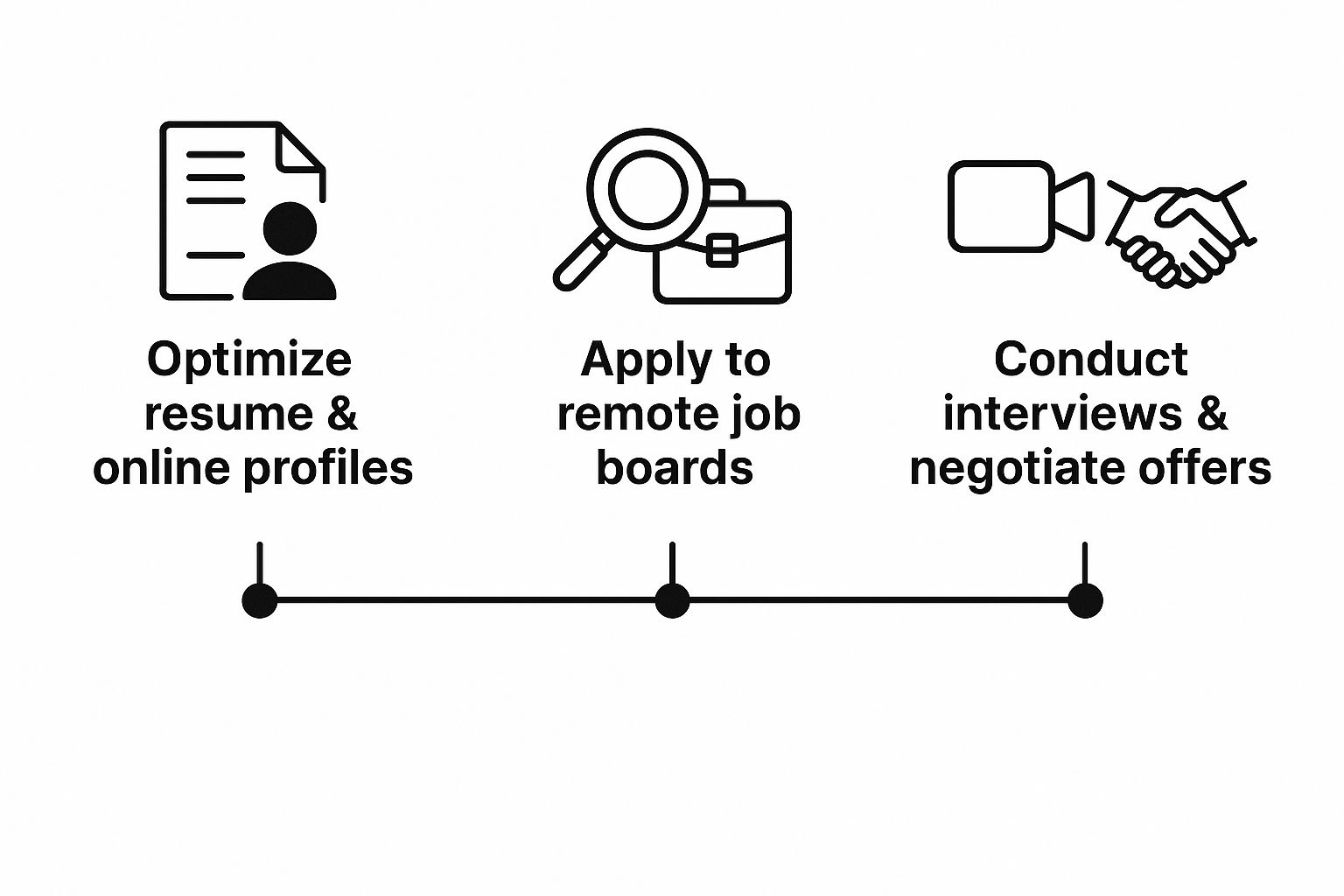
How to Get a Remote Job: Your Complete Success Guide
Published
Understanding What Remote Employers Really Want
The remote job market is thriving, but it's essential to recognize that not all remote positions are the same. Some companies fully embrace remote work, cultivating a remote-first culture, while others are still in the experimental stages. This distinction makes understanding employer expectations crucial for a successful job search.
A key factor is identifying industries truly committed to remote work. While tech companies have historically been at the forefront, other sectors are rapidly adopting remote work practices. Healthcare startups and even traditional finance companies are increasingly forming distributed teams.
This growth in remote opportunities across diverse industries reflects a fundamental shift in business operations. The number of fully remote jobs has steadily risen, making these positions accessible to a wider range of professionals.
Data from Robert Half reveals that fully remote jobs grew from 10% of all job postings in Q1 2023 to 13% in Q1 2025. Some reports even suggest higher figures, reaching 15% by Q4 2024, depending on the source. This growth isn't confined to tech; industries like healthcare, finance, and education are also embracing remote roles. Find more detailed statistics here.
Identifying Truly Remote-Friendly Companies
Beyond specific industries, grasping a company's remote work culture is paramount. Look for companies that emphasize collaboration and communication in their job descriptions and website content.
Researching employee reviews on sites like Glassdoor offers valuable insights into a company's remote work environment. This research helps determine if a company's remote culture is genuine or simply a recruitment tactic.
What Makes a Role Remote-Ready?
Some roles are inherently better suited to remote work than others. Roles involving independent work, such as writing, design, or software development, are often prime candidates.
However, many traditionally office-based roles are successfully transitioning to remote work with the right tools and strategies. Project managers, customer service representatives, and even sales teams can thrive remotely. Check out our guide on How to master influencer marketing remotely. This adaptability underscores the growing acceptance and practicality of remote work across diverse functions.
By focusing your search on companies and roles aligned with remote work principles, you significantly improve your chances of securing a remote position. This targeted approach not only helps you find a remote job but also sets the stage for a fulfilling and successful remote career.
Developing Skills That Remote Employers Actually Value
Landing a remote job isn't just about working from home. It requires a specific skill set that many traditional employees haven't yet fully developed. To thrive in the remote work world, you need to master certain key competencies. These include advanced digital communication skills, effective self-management techniques, and proficiency in various collaboration tools.
Mastering The Art of Digital Communication
Effective digital communication is essential for building and maintaining strong relationships in a remote work environment. It's more than simply sending emails; it involves accurately conveying tone, ensuring clarity, and expressing empathy through written messages. This necessitates careful word choice, concise writing, and active listening during virtual meetings. Understanding and adapting to different communication styles is also crucial for successful remote collaboration.
Self-Management: The Key To Remote Productivity
Self-management is fundamental to remote work success. This includes setting clear objectives, prioritizing tasks, and managing your time effectively without constant direct supervision. Honing your organizational skills, establishing a dedicated workspace, and minimizing distractions are also vital. Essentially, you become your own project manager—responsible for delivering results on time and remaining accountable to both yourself and your team.
Collaboration Tools: Beyond Basic Video Calls
Proficiency in collaboration tools extends beyond merely joining a video conference. It's about effectively using project management platforms like Asana or Trello, communication tools like Slack, and mastering file-sharing systems. This technical fluency allows for seamless teamwork and guarantees everyone stays connected and informed, regardless of their location. Understanding the nuances of each platform and utilizing its features is crucial for remote work efficiency. The growing remote work market is fueled by the increasing adoption of these digital tools and platforms that facilitate collaboration and productivity. Consequently, job seekers who develop skills in digital communication, project management, and remote work tools will have a distinct advantage in securing opportunities across various industries and locations. Explore this topic further.
Essential Technical Skills For Remote Success
Specific technical skills are rapidly becoming essential requirements in the remote work environment. Depending on your field, these could include expertise in particular software applications, data analysis tools, or cybersecurity best practices. Identifying these in-demand skills and proactively pursuing relevant training or certifications can considerably enhance your remote job prospects. For instance, a remote marketing professional might need to master SEO tools and social media management platforms.
Creating Applications That Speak Remote Work Fluency

Your resume and cover letter are your first impression. They are key to showcasing your remote work readiness before you even get to the interview stage. This means reframing your experience, even if it's entirely office-based, to highlight transferable skills and remote-relevant achievements. This section will guide you through creating applications that truly resonate with remote hiring managers.
Highlighting Remote-Relevant Skills and Experience
Start by identifying the skills most valued in remote positions. These often include independent work habits, proactive communication, and strong problem-solving abilities.
For example, if you consistently met deadlines without supervision, emphasize this to demonstrate your self-management skills. If you led projects involving cross-functional teams, highlight your communication and collaboration expertise.
Tailor your resume and cover letter to each specific job description. Research the company’s remote work culture and use relevant keywords. This shows you understand their needs and have a genuine interest in the role.
Using Language That Resonates With Remote Hiring Managers
Remote hiring managers look for specific language and keywords. Instead of simply listing responsibilities, quantify your accomplishments.
For instance, instead of "Managed social media accounts," write "Increased social media engagement by 20% within six months." This data-driven approach showcases your effectiveness.
Share stories demonstrating your ability to deliver results in a distributed environment. Perhaps you led a successful virtual team project or implemented a new communication strategy that boosted remote team cohesion. These narratives offer compelling evidence of your remote work capabilities. Data analysis shows the importance of showcasing quantifiable results and adaptability to remote environments.
Crafting a Compelling Remote Cover Letter
Your cover letter is your chance to share your remote work story. Don't just repeat your resume; explain your passion for remote work and how your skills align with company values.
Address any potential concerns about your remote work experience directly. If you're new to remote work, highlight transferable skills and your eagerness to embrace this work style.
Examples and Templates For Remote Job Applications
Use proven templates and real-world examples to structure your application effectively. Many online resources offer sample resumes and cover letters specifically designed for remote job seekers. These resources provide valuable starting points for your application.
To better understand the key differences when applying for remote positions, take a look at the comparison table below:
Remote Job Application Essentials vs Traditional Applications: Key differences between crafting applications for remote positions versus traditional in-office roles.
| Application Element | Traditional Focus | Remote Focus | Key Phrases to Include |
|---|---|---|---|
| Work Experience | On-site accomplishments | Remote-relevant skills & achievements | "Self-motivated," "Results-oriented," "Remote collaboration" |
| Communication Skills | In-person interactions | Digital communication effectiveness | "Proactive communication," "Virtual team leadership" |
| Technical Skills | Software proficiency | Collaboration tool expertise | Asana, Slack, Zoom, "Project management software" |
| Cover Letter | General career overview | Remote work enthusiasm & suitability | "Passionate about remote work," "Thrive in distributed teams" |
This table summarizes the key differences in application elements between traditional and remote job applications. Focusing on these remote-specific aspects helps communicate your readiness to succeed in a virtual environment.
By mastering the art of crafting remote-focused applications, you’ll significantly boost your chances in a competitive job market. This approach demonstrates your grasp of remote work principles and positions you as a desirable candidate.
Mastering Remote Interviews That Lead to Job Offers

Remote interviews demand a different approach compared to traditional, in-person interviews. Understanding these nuances is crucial for landing a remote job. This section will provide you with the essential skills to excel in video interviews, from technical preparations to effective on-camera communication. For further insights, you might find this helpful: How to master remote interviews.
Setting The Stage For A Successful Video Interview
First impressions are paramount, especially in remote settings. Ensure your technology is reliable. Test your internet connection, microphone, and camera well in advance. Choose a quiet, well-lit space free from distractions to project a professional image. This shows your preparedness and respect for the interviewer’s time.
Body Language and Communication For The Camera
Even though you're not physically present, your body language still communicates significantly. Maintain eye contact by looking directly into the camera, not at the screen. Sit upright and actively engage, mirroring how you would behave in person. Clear and concise communication is also key. Speak clearly, avoid interrupting, and listen attentively. These practices convey confidence and professionalism through the screen.
Answering Remote Work-Specific Interview Questions
Remote interviews often feature questions specifically related to the remote work environment. Prepare to discuss how you manage distractions, organize your time effectively, and maintain productivity without direct supervision. Sharing concrete examples of your self-discipline and organizational abilities demonstrates your remote work readiness.
For instance, describe how you successfully managed a project with a distributed team or maintained high productivity while working remotely in a previous role. Quantifying your accomplishments with data will make your responses even more impactful.
Demonstrating Remote Work Readiness
Highlight your experience with common collaboration tools. Discuss your proficiency with platforms like Slack, Asana, or Zoom. Technical fluency with these tools is a valuable asset in remote work. Showcasing your adaptability to various communication styles and time zones further reinforces your suitability for a remote position.
Practicing For Real-World Remote Interview Scenarios
Practice answering common remote interview questions. This preparation builds confidence and helps you articulate your remote work skills effectively. Conduct mock interviews with friends or family to receive valuable feedback. These simulated experiences can alleviate anxiety and enhance your performance in real interviews.
Additionally, research the company's remote work culture to align your responses with their values. Demonstrating an understanding of their remote work practices can give you a distinct advantage over other candidates.
By mastering these techniques, you'll present yourself as a confident and capable remote worker, significantly boosting your chances of securing your desired remote job. This preparation ensures you're not only technically proficient but also possess the essential soft skills needed to thrive in a distributed team environment.
Leveraging The Growing Momentum Behind Remote Work
The shift towards remote work is reshaping the professional landscape. It's not a passing fad, but a fundamental shift in how we approach our careers. Understanding this growing momentum can be a real advantage in your remote job search. By recognizing the reasons behind this change, you can present yourself as the perfect candidate for companies embracing distributed teams.
Why Companies Are Embracing Remote Work
Several factors contribute to the rising popularity of remote work among employers. Cost savings are a primary driver. By reducing the need for extensive office space and related expenses, companies can significantly lower overhead.
Remote work also provides access to a much broader talent pool, unrestricted by geographical boundaries. This allows companies to tap into specialized skills and expertise that might not be available locally.
Another compelling reason is increased productivity. Research suggests that remote workers often outperform their office-based counterparts. This boost in output can be attributed to factors like shorter commutes, fewer distractions, and greater autonomy.
Furthermore, remote work offers a competitive advantage in attracting and retaining top talent. Flexibility is a highly sought-after benefit in today's job market. The shift to remote work has been dramatic, particularly since the start of the COVID-19 pandemic. In 2020, only about 13% of the global workforce reported working remotely. By 2023, that number had more than doubled to approximately 28%. Companies are responding to this demand for flexibility, with surveys showing that as many as 91% of employees worldwide now prefer to work fully or primarily remotely. For more detailed statistics, check out this blog post: Remote Work Statistics.
Identifying Companies Expanding Their Remote Workforce
For a focused job search, it's essential to identify organizations actively expanding their remote teams. Look for companies that use keywords like "remote," "distributed," or "flexible" in their job descriptions and website content.
Company blogs, social media activity, and news articles can also provide valuable insights into their remote work policies.
Understanding Business Drivers Behind Remote Hiring
To tailor your applications effectively, delve deeper into the specific business reasons driving remote hiring decisions. For instance, a company expanding globally might prioritize candidates experienced in working across different time zones.
A startup focused on rapid growth might value adaptability and comfort in fast-paced, dynamic environments. Understanding these nuances allows you to customize your resume, cover letter, and interview responses to directly address the company's specific needs. This strategic approach presents you not just as a job seeker, but as a solution to their remote work challenges. For those interested in improving communication in a virtual setting, resources like virtual leadership training can be beneficial.
Positioning Yourself Within the Flexibility Revolution

The modern workplace has undergone a significant transformation. Workplace flexibility is no longer considered a supplementary benefit but rather a fundamental expectation for many professionals. This growing trend towards remote work presents numerous advantages for those who embrace and adapt to this evolving work environment. Understanding how to position yourself within this flexibility revolution can greatly influence your job search success.
Understanding the Modern Professional's Desires
Today's professionals are increasingly prioritizing flexibility and autonomy in their careers. This extends beyond simply working from home. It encompasses having greater control over their work schedules and location. This desire for increased control significantly influences career decisions, impacting job choices and salary negotiations.
For instance, many individuals are now willing to accept a slightly lower salary in exchange for the benefits of remote work. These benefits often include reduced commuting time and a better work-life balance.
Additionally, remote work provides increased opportunities for continuous learning and professional development. The time saved from commuting can be reinvested in acquiring new skills. This can involve taking online courses through platforms like Coursera or participating in industry webinars. This commitment to ongoing growth enhances career prospects and ensures remote workers remain competitive. For those interested in remote opportunities within the social media marketing field, check out this helpful resource: How to master social media marketing remotely.
How Companies Respond to Flexibility Preferences
Progressive companies are recognizing these evolving preferences and adapting their strategies accordingly. They understand that offering remote or hybrid work options is crucial for attracting and retaining top talent. This trend is supported by significant statistics. According to a 2025 study by Owl Labs, 71% of full-time employees prefer to work remotely at least three days a week, highlighting a strong preference for flexible work arrangements.
Companies that fail to adapt risk losing valuable employees. The same study indicated that 38% of employees would consider leaving their current role if denied remote work options, and 31% would actively seek new employment if flexibility were removed. Find more detailed statistics here. The shift towards remote work ultimately benefits both employers and employees, fostering a more productive and engaged workforce.
Embodying the Values of Effective Remote Work Culture
To thrive in the remote job market, it’s essential to not only understand but also embody the core values of a successful remote work culture. This involves demonstrating proactive communication, strong self-discipline, and a results-oriented mindset. During job interviews and salary negotiations, confidently articulate the benefits of remote work and explain how your skills and experience align with this new working model. By showcasing a genuine understanding of remote work principles, you will position yourself as a valuable asset to any remote team.
Your Strategic Action Plan for Remote Job Success
This section helps you translate your knowledge into an actionable plan for landing your dream remote job. We'll provide a clear timeline, daily and weekly activities, and milestones to track your progress. This includes networking strategies, application tracking, effective follow-up techniques, and solutions to common roadblocks. The following infographic visualizes the three key stages: optimizing your resume and online profiles, actively applying to remote job boards, and successfully navigating interviews and offer negotiations.

This visual emphasizes a structured approach. It starts with foundational preparation, progresses to active job seeking, and culminates in securing an offer. Remember, the process isn't strictly linear; each stage informs and strengthens the next.
Building Your Remote Job Search Timeline
A well-defined timeline keeps your job search focused and efficient. Treat your search like a project with distinct phases. Here's a sample 12-week timeline:
Phase 1: Preparation (Weeks 1-4): Refine your resume and online presence. Research target companies and industries. Network within remote work communities. This initial phase sets the foundation for a successful job search.
Phase 2: Active Application (Weeks 5-8): Submit targeted applications. Tailor your cover letter to each role. Practice your remote interviewing skills. This phase focuses on actively pursuing job opportunities.
Phase 3: Interview and Negotiation (Weeks 9-12): Prepare for video interviews. Follow up strategically. Negotiate your salary and benefits. This final phase focuses on securing the best possible offer.
This structured approach ensures consistent progress and prevents feeling overwhelmed. A strategic plan also acknowledges the intersection of work and personal life. For strategies on effectively balancing work and family life, explore this helpful resource.
To provide a more detailed view of this 12-week plan, let's examine a breakdown of activities and goals within each phase. The following table outlines a 30-60-90 day plan, adapted to fit our 12-week timeframe:
30-60-90 Day Remote Job Search Timeline
A structured plan breaking down specific activities and goals for each phase of your remote job search
| Time Period | Key Activities | Goals | Success Metrics |
|---|---|---|---|
| Weeks 1-4 (Days 1-30) | Update resume and LinkedIn profile. Research remote job boards and target companies. Connect with professionals in your field. | Identify 10-15 target companies. Build a network of 5-10 contacts. Refine your personal brand. | Completed resume and LinkedIn profile. List of target companies and contacts. |
| Weeks 5-8 (Days 31-60) | Submit 5-10 applications per week. Practice answering common interview questions. Attend virtual networking events. | Secure 3-5 initial interviews. Gain a deeper understanding of the remote job market. | Number of applications submitted. Number of interviews scheduled. |
| Weeks 9-12 (Days 61-90) | Participate in interviews. Follow up with potential employers. Negotiate salary and benefits. | Receive 1-2 job offers. Successfully negotiate a competitive compensation package. | Number of job offers received. Final salary and benefits package. |
This table offers a clear roadmap for your remote job search, breaking down the key activities and goals within each phase. Tracking these metrics provides valuable insights into your progress and helps you stay on track.
Daily and Weekly Activities for Success
Consistency is key in any job search. Dedicate specific times for job-related activities.
Daily: Check job boards, tailor applications, network on LinkedIn. These daily actions keep your job search active and top-of-mind.
Weekly: Review your progress, refine your strategy, connect with mentors. Weekly reviews help assess your overall progress and make necessary adjustments.
This routine maintains momentum and ensures you're actively engaged in your search. Regular review identifies roadblocks early and allows for adjustments.
Tracking Your Progress and Staying Motivated
Maintaining organization and motivation is crucial, especially during a prolonged job search. Track your applications, interviews, and follow-ups meticulously. Celebrate small wins and don't be discouraged by rejections. Finding the right remote job takes time and effort. Stay persistent and focused on your goals. Looking for opportunities in influencer marketing? Explore remote and on-site roles at Influencer Marketing Jobs. Connect with top brands and agencies seeking skilled professionals.